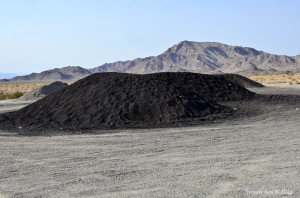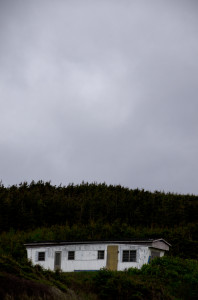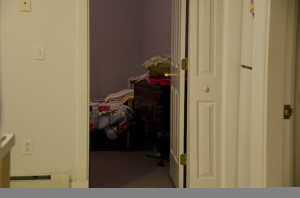A Small Happiness
by Katie McClendon
It happens fast, and over a period of months. When Ratchet and Lana finally break up, Ratchet doesn’t want to be alone so she spends the day in her mother’s garden in Issaquah, wearing sunglasses and sitting on a lounger while her mother gardens and lets her talk or not talk—depending on what she needs. She’s twenty-three and wants to be an adult about it, but it feels good to be cared for by her mother, who makes sweet iced tea and brings her little bowls of strawberries with the stems cleanly sliced and removed. Ratchet curls up on an outdoor lounger and cries. Lana told her their love was epic. It was their first, their hardest love. Ratchet doesn’t understand why Lana wants to date other people—to make some mistakes, to be frivolous, she’d said—because wasn’t the whole point to find the person who wasn’t a mistake? When she is taken over by the thought of Lana with someone else, she leans over and pukes on the stone pathway. Her mother helps her inside and fills a glass with cool water for her to drink. She wets a washcloth and places it on Ratchet’s neck, brushing the short black curls of her hair out of the way. It reminds Ratchet of being sick as a child, and she tells her mother she isn’t sure she’s going to get better. Her mother says, “Rachel, darling, I know it doesn’t feel like this yet, but it will get easier.” The first cut is the deepest, Ratchet thinks. The stupid song plays over in her mind.
That night, her father brings home a carton of mint chocolate chip ice cream and steaks to grill in the backyard. They eat together under the shade of Evergreens at the glass patio table. Her parents only ever loved one another, but they tell Ratchet about friends and family members who’d suffered broken hearts. They tell her about the hearts they’d broken before they met, making a night of it, releasing heartbreak into the air. As she cuts into the meat of her steak, slicing to feel the tear then pushing the meat aside, Ratchet thinks, I wish Lana was here. She wants to call her, but her mother suggests she give it time.
In Emma’s basement apartment, they listen to old records—Fleetwood Mac, Pink Floyd, Blondie—and drink whiskey sitting cross legged on the living room floor. The two of them have been spending a lot of time together since Ratchet and Lana broke up. They both work at a call center, cold calling to ask people about chimney cleanings or vacuums, depending on the shift. Emma helps the shifts pass, speaking in an exaggerated sexy voice about the dangers of a dirty fireplace to the strangers who answer, or drawing pictures on scraps of paper as the automatic dialer works through another set of numbers. Emma is not quite beautiful, with long dark hair and lanky limbs. There’s a strange charm to her face because of her openness. She doesn’t smile easy, but there’s an intensity to her gaze.
Lana’s friends had been Ratchet’s friends, and since the break up she’s been having a hard time getting them to meet up. She reasons that it could just be the end of fall shift in Seattle, when things get cold and people stay indoors, agreeing to hangouts and then backing out last minute. Her mother has been leaving messages for Ratchet, but she approaches everything as if it is a bird with a broken wing, and Ratchet is tired of feeling broken in that way. With Emma, she is able to pretend for small moments that she is not shattered by Lana, that she is normal and whole and doing just fine. There is something about the way Emma allows her to try on different feelings—rage, detachment, grief, hope—that eases things. Lately, every feeling and thought is about a girl. Ratchet tries to remember caring about anything else. Tonight, Emma has been thoughtful about the lighting; the room is dim lit and soft, and she has unwrapped a tarot deck from a silk scarf and placed it in Ratchet’s hands.
Emma has dressed for the occasion, her long, dark hair wrapped in a half-hearted turban that keeps unraveling. She’s placed heavy gold bangles on her wrists, and they jangle whenever she lifts her glass to drink. Around her neck, she wears a giant piece of costume jewelry that seems all pendant, a deep green that Emma says helps her tap into her intuitive side. She’s wearing a cotton dress with thin straps and has wrapped a golden scarf around her shoulders for effect. Her mouth is bright red, and she seems to be leaving a trail through the house, the half-print of her mouth on glass rims and cigarette butts and half-eaten pizza slices. Everywhere Ratchet turns, there is a reminder—like evidence of a murder—of Emma’s mouth. Ratchet has shown up in the same baseball tee she’s been wearing for days, the same dark jeans. It took all she had to leave the house. She’s stopped washing her hair, and it’s sticking out from under her beanie because she’s given up on the idea of brushing it. Her mother calls daily to remind her to do the little things: wash her face, take out the trash, eat something. It’s a relief to have someone to tell her what to do.
Shuffle, without bending the cards, and ask a question, Emma says. When you feel ready, hand the deck back to me. And then, after a pause, she says, You don’t have to ask the question out loud.
Ratchet tries to shuffle the deck as if they are playing cards, but they’re clumsy in her hands so she sets them down on the carpet and moves them around. They are slick, and she tries to think about love or about Lana, but the texture of the cards, the unmanageability of them under her hands is concerning. She isn’t sure of her question. When she looks up, Emma is sipping from a short glass and bobbing her head to the music with her eyes closed. Ratchet wonders what Lana is doing right now, where she is in the world in relation to them, how far away. She imagines Lana in her apartment curled up in bed, too grief stricken to move. Deep down, she knows that Lana is probably out dancing. Ratchet puts the cards back together, cuts the deck, and hands it back to Emma. She has the feeling that it doesn’t matter what question she asks, that the whole thing is just an excuse to stop being in charge of finding her own answers.
Emma lays out the cards. They have frightening images on them, lightning strikes a withered, solitary tree and three snakes coil around a sharp edged sword. Ratchet is nervous, but Emma says the cards represent change, and it’s no reason to worry. You already know things have changed, she says.
Ratchet wonders about this. At night, right before she falls asleep, she can forget things are different. During the day she has been thinking about other things, forgetting for a moment the absence of Lana. Her mother says this is progress, but it feels like moving backwards, like stepping back in time but only getting to be in the moments between the moments when she was with Lana—the moments when she could take things for granted, and she could do normal things like peel and eat an orange without thinking of Lana in a heavy, missing way.
When Ratchet talks about missing Lana, Emma listens as if they are simply talking about two girls Ratchet knows, women Emma has never met. Ratchet is grateful for this, but she feels Emma’s desire to unclench her fists from the idea of Lana and shift the tight hold to her own heart every time Emma attempts to cheer her up, or steer her in the direction of moving on.
Ratchet leans back and closes her eyes. She feels the dizzy spin of too much whiskey, and when she opens her eyes Emma says, Change is scary, but we need the heartbreak to know the good.
Ratchet isn’t sure if Emma believes this. It’s a stupid thing to say. Before Lana left, Ratchet was deliriously aware of the good. Every cell of her body knew the high of being in love, of being loved. Ratchet is annoyed with the way Emma reduces matters of the heart to a platitude, and speaks as if she knows best when here she is, moving her hair away from her neck. Here she is, letting her hand graze Ratchet’s arm. Here she is, mouth bright and buzzed, and easy enough to kiss. It reminds Ratchet of the time, a few days before, when the two of them went into a party store because Emma had said, We need to get supplies for your pity party. Ratchet refused to stop sulking while they drove around looking for found items Emma could use to make sculptures, and Emma said, God damn it, I can’t take this one more minute, and drove with the radio blasting Cat Power to a place off 99. At the store, Emma picked absurd things from the shelves and shoved them at Ratchet: a yellow clapper shaped like hands that snapped like applause. Here, she said. Now, when you need to feel applauded for being the most broken hearted person in the world, you can just use this. Emma stood in the aisle, snapping the clapper slow and mean, her mouth pinched in anger. It was impossible not to think of Lana, and how—when Ratchet was upset—Lana would draw a bath and overfill it with bubbles, put on some moody music and pour them glasses of champagne. Ratchet sat down right there in the aisle, under the bright fluorescent lights, and cried, wanting and not wanting the bath and feeling terrible for wanting anything at all, and for having nothing to give. Emma stopped, and set the clappers on a shelf. She sat down on the floor with Ratchet, putting her arm around Ratchet’s shoulder, and said, That was mean. She leaned her head against Ratchet’s shoulder, and Ratchet had felt so hurt, but also comforted. It was strange to think, but Emma’s anger had sparked a kind of wanting in Ratchet, an ugly and selfish desire.
Some days, it is easy for Ratchet to pretend she is being fair to Emma, and asking only as much as she deserves. Ratchet quiets the part of herself that knows she just needs Emma to prove she’s worth loving—that Lana didn’t leave because Ratchet is wrong somehow. She ignores the part of her that needs to feel it is Lana who is broken, who is wrong about love. But in the basement, she feels the space around her opening up, wide and empty, and she is so alone in it, so she says, Be close to me. Ratchet stretches out her arm and waits.
Emma takes off her bangles and lifts the pendant over her neck. She unties the turban, letting her hair fall down her back, and sets it on the carpet. When Emma lies down next to her, Ratchet can feel her breathing shift. Emma is taller, and when she rests her head against Ratchet’s shoulder, she has to bend her knees. The record ends, replaced by the repetitive thrum and silence of the needle catching. Emma smells like cigarettes and whiskey and lipstick, and Ratchet says, Why do you hang out with such a miserable wreck?
I like a challenge, Emma says, and Ratchet feels there is more to it, but doesn’t know how to ask again.
The room tilts and Ratchet imagines that she is the stone being pushed up the hill in that Greek myth—she can’t remember the name of it—that will keep rolling downhill, only to be pushed up again the next day. Emma is the kind of girl who will keep pushing me uphill, she thinks. Her chest fills with gratitude. She knows it isn’t fair of her, but she needs to keep Emma close. For the first time since her and Lana broke up, she feels a small happiness. She shifts so they can see eye to eye, and realizes for the first time that Emma has one blue and one green eye. Her eyes are like a spell cast, and Ratchet pushes away thoughts of Lana, and of what will happen, and whether or not the feelings are real as she leans forward into a deliberate kiss.
At first, Emma is surprised. She pulls back and looks at Ratchet, her face scrunched as if she’s trying to see the smallest thing but can’t quite. Are you sure? she asks, and Ratchet nods. Emma’s face softens, but she hesitates. She looks pained, and Ratchet takes her hand and kisses the ends of her fingers. Between them, a charge begins, and Ratchet becomes lost in it.
Emma reaches for the hem of Ratchet’s shirt, lifting it slowly. Ratchet shakes her head and pulls the hem down and Emma nods. Ratchet begins to cry at the feel of Emma’s warm palm over her shirt. It sits on her chest, placed firmly over her heart as if holding it beneath the bone, keeping it still. I’m not ready, she whispers and Emma doesn’t speak. Ratchet looks into her face and sees such tenderness, and a little hurt, and can’t help but kiss her again.
To ease her guilt, Ratchet splits herself into two near duplicate copies in her mind—The Ratchet of Lana & Ratchet is separate from the Ratchet of Emma & Ratchet. They decide to keep things quiet. Not a secret, Ratchet says, but let’s just keep this between us.
One night, Lana begs her to come over, so Ratchet goes to her apartment. Lana answers the door in her pajamas, and whispers, I miss you. She looks as if she hasn’t gotten out of bed all day. Ratchet cries ugly tears and they have sex in the entry way, on the thin carpet. The intensity of Ratchet’s need is violent. After, they take a bath together and Lana admits that she’s been seeing someone in particular, and a few other people in general. I’m trying to figure out what I want, she says as she dissolves bath bubbles with her finger. Ratchet smacks the water like a child and enjoys the sting of it against her palm, smacking until it becomes ridiculous and her hands sink, aching, below the surface. Lana stretches back against the tub, across from Ratchet, her blonde curls sticking to the sides of her face, her lips red from kissing, her collarbone still a thing that can take Ratchet’s breath away. She watches Ratchet with the calm of a person watching a television show and Ratchet thinks she is going to be sick. Ratchet says, Is any of it serious? Do any of them know about me?
Lana laughs, a force of air from her throat, and says bitterly, They don’t know much about me. I prefer it that way. And then, as she lowers herself into the water, I can’t stand the thought of being in love again.
Ratchet climbs out of the tub and puts her clothes on without drying, leaving Lana scrambling to get dressed, calling out Wait, please, let’s talk.
Ratchet goes straight to Emma’s house. She stands in the living room and cries but they don’t talk about why. Emma helps her undress and climb into bed, kisses her hot forehead and lets her sleep. When Ratchet wakes up, Emma is at the kitchen table, the tarot cards spread before her. She looks over, and says, Do you want some tea?
Ratchet shakes her head. I’m sorry, she says. I don’t know what’s wrong with me.
It’s okay, Emma says. She walks over to the bed and stretches out next to Ratchet, moving close to her, but Ratchet feels the tears coming again and says, Please. I can’t.
She gets up and puts on her shoes, and without kissing Emma, says goodbye.
Several days later, Lana shows up at Ratchet’s apartment just before the bars close and asks if she can come in. She is tipsy, and had been out on a date. At the bar, she’d started flirting with other women as a sort of game, to see what would happen, and her date had stormed out, furious. She climbs into Ratchet’s bed without taking off her heels, still fully dressed, and says she’s tired and could she just lay down a while?
Ratchet goes to bed a little while later, after pulling off Lana’s shoes and hanging up her coat. In the early morning, Lana wakes and pulls Ratchet close and it’s so natural—like nothing has changed— it doesn’t even occur to Ratchet, until later, they should not have slept together.
Ratchet switches to night shifts to avoid being home if Lana shows up again. Emma leaves messages asking if everything is okay. She works in the afternoon, and when their shifts overlap she looks at Ratchet over the short cubicle wall but keeps to her calls. She’s stopped drawing pictures and passing them to Ratchet, who feels guilty for the way she’s treating Emma. One evening, they find themselves alone in the break room.
Hey, Emma says, without looking up from her copy of The Stranger. The fluorescent lights cast everything in a sickening bright.
Ratchet sits down across from Emma and reaches out a hand. Emma, she says.
Emma looks up, but her face is tense with anger. She looks as though she is trying not to cry.
Emma, Ratchet says again, and this time it sounds more like a demand. She hadn’t meant to make it sound angry, and feels terrible when Emma’s eyes grow wet. Hey, she says, speaking more quietly, Do you want to get a drink later? She isn’t sure if she asked because she misses her friend or out of guilt.
Emma looks down at the paper and doesn’t speak. After a moment, she says, Why have you been avoiding me?
I’ve just been dealing with some things, Ratchet says. I’m sorry.
Emma softens her expression and nods, What time are you off?
When they kiss, back in Ratchet’s apartment, Ratchet pours forth all of her desire to be loved and worth loving, as if sex is a bout in the larger battle to be worth it. She empties herself of every loving feeling, pushing out love until she feels cleanly hollow of it. In this way, she can give and also clear herself out of anything to give. Ratchet bites and bruises and suckles and kisses. Emma wrestles and smacks and pulls and chokes, until they pull each other finally into a sweetheart hold, spooning as their breathing slows.
After, as they lay together, Ratchet gives away Lana’s secrets like little treasures. She hated her father for being so detached. She never wants to be like her mother, an accessory for her father. She wanted to be fucked from behind while blindfolded. If she was naked, she cried when I kissed her kneecaps. She told me she loved me right before she came, but only if we’d been fighting. She’s worried she will die and it won’t matter.
Ratchet talks because she thinks it will help, like lancing a wound and letting it weep. After, she is lighter, like what she knew of Lana is a pile of rocks she placed in another person’s pockets. Emma uncurls herself from Ratchet and moves away, not turning around. I don’t want to know these things, she says.
I’m sorry, Ratchet says but she doesn’t reach to pull Emma closer. Instead, she closes her eyes and focuses on the air between them, allowing the space to remain. It shivers between them, a chasm. It is not so hard, the distance, she thinks.
In the morning, Ratchet wakes to the sound of a knock at her door. It’s early, but she can’t see the clock. Emma shifts, but doesn’t wake. As soon as Ratchet opens the door, Lana walks in as if she no longer needs to be invited. Lana looks disheveled, and her outfit seems more appropriate for a night out than an early morning walk. Ratchet catches her by the arm as she brushes past. Now isn’t a good time, she says.
I was in the neighborhood, Lana says, looking around the living room. Let’s get brunch. She moves toward Ratchet to pull her into a kiss, but Ratchet steps back.
It’s not a good time, Ratchet says. From the bedroom, she hears Emma stirring.
Lana shifts her head, listening. Ratch, she says, squinting her eyes and smirking, do you have an overnight guest? Her tone is playful, almost sarcastic, but Ratchet hears it waver. Under the smirk, she can see a pained expression forming.
Yes, Ratchet says, I do.
Lana whispers, Does she know about me? poking Ratchet in the chest in a way that feels half joke, half accusation. Is it serious?
The shifting from the room grows quiet, and Lana stands frozen, her finger still touching Ratchet’s chest.
I don’t know, Ratchet says. I’m trying to figure out what I want. From behind them, the bedroom door opens. Emma stands in the doorway, looking as though she isn’t sure if she should move forward or go back inside the room.
Hiiiiii, Lana says, stepping away from Ratchet, I’m Lana.
Oh, Emma says. She blinks fast, and puts a hand to her hair to smooth it. She looks defeated. Should I go? Ratchet hadn’t admitted to sleeping with Lana, couldn’t tell Emma she was working her way free of that old love, struggling to climb out from beneath the weight of it.
Ratchet looks at Lana, then at Emma, and the two distinct Ratchets she’s been holding in her mind dissolve.
I’ll go, Emma says, turning to get her things.
Lana looks so pleased with herself, so confident. Ratchet regrets hesitating for even a second. Emma, Ratchet says, stay.
Lana’s face crumples, the confidence replaced with confusion. But, she says, I need to talk to you.
Lana, Ratchet says, You can’t just come here whenever you feel like it.
But Ratch, she says, I need you.
Emma stands in the bedroom doorway. Ratchet can sense the anxiety in the shift of her movements. She thinks about yellow hand clappers and tarot cards, and herself as a heavy stone at the bottom of a steep hill. She thinks about Lana’s kneecaps and wildness, her ability to show up in any space exactly as herself, and how there is an invisible line of energy, like a thread of light, always connecting the two of them in a room. If she’d had a pair of scissors, she would have sliced cleanly through thread, would have cut out all of Emma’s sweet behavior, would have trimmed around the edges of herself, even, to be disconnected from this moment of having to make a choice.
I need to be alone right now, Ratchet says, keeping her eyes on the floor.
Do you want me to go? she hears Emma ask, in a timid voice, from the doorway of the bedroom.
Yes, Ratchet says. As soon as she says it, she understands that although it is a lie, it is the only thing she can say, and she imagines it leading the three of them back to a small happiness, and it is enough.
-------------------------------------------------
Katie McClendon received her M.F.A in fiction from Purdue University. She is currently working on her first novel, and adjuncting at Indiana University – Kokomo and Loyola University in Chicago. She is a writer, a performative introvert, and a West Coast kid. Although she identifies as a fiction writer, her poems have appeared in Ante Review, Mare Nostrum and Portland Review. Her fiction has been published in SmokeLong Quarterly. One day, she’d like to work on a seven season television show a la Buffy or Six Feet Under. If anyone is looking for someone. To do this.








